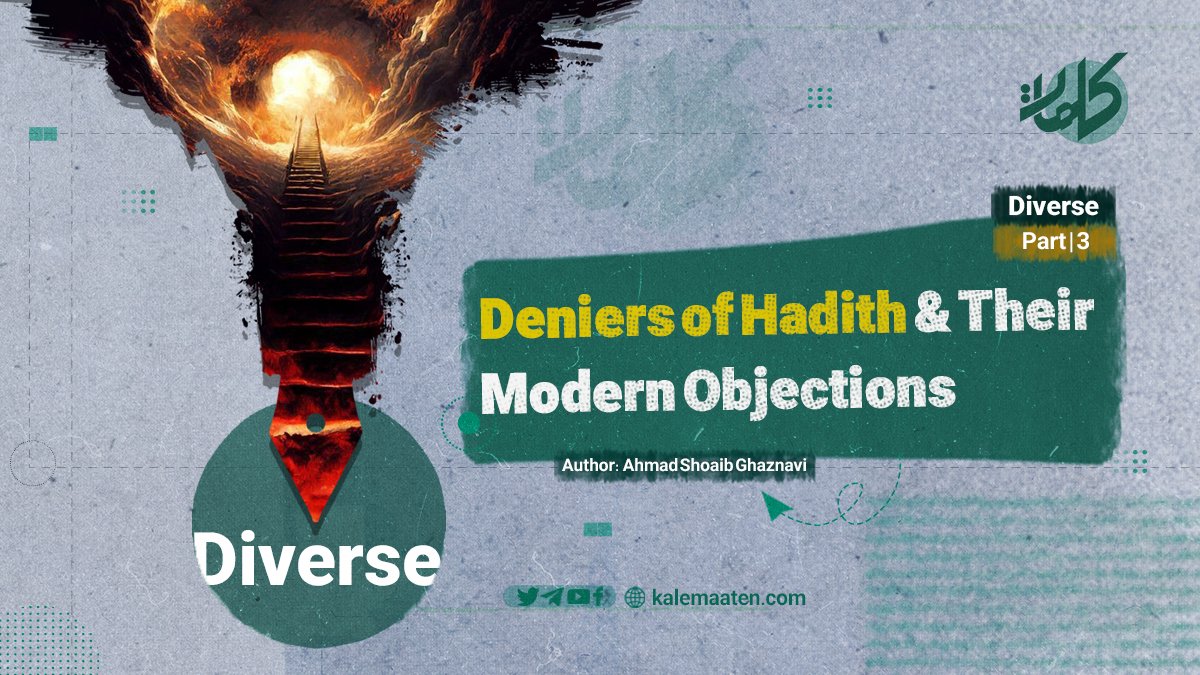Author: Ahmad Shoaib Ghaznavi
Deniers of Hadith and Their Modern Objections (Part Three)
The Most Prominent Groups of Deniers of the Sunnah in Contemporary Era
Orientalists: These are Western scholars who research Islam, the Arabic language, and Eastern cultures. Many of them pursued missionary objectives and sought to undermine the authority of the Prophetic Sunnah to diminish its value among Muslims. They questioned the integrity of Hadith narrators and claimed that the Sunnah is in conflict with the Quran and that the Hadith contradict each other. Their goal was to separate the Qur’an from the interpretive sources of the Sunnah and create a crisis within Islam.
The Khawarij’s Perspective on the Sunnah
Before the arbitration conflict (Fitnat al-Tahkim), the Kharijites accepted the Sunnah as the second source of legislation. However, after this event, they began to question the integrity of the Prophet’s Sahaba and rejected their narrations. In theological and jurisprudential matters, they relied solely on the Qur’an and their reasoning.
The Khawarij’s Exploitation of Denying the Sunnah
The Kharijites viewed the Sunnah as their primary obstacle in achieving their extremist objectives and spreading chaos. To disrupt societal order, they cast doubt on the authenticity of Hadiths and the obligation to follow the Sunnah.
The Mu’tazila’s Perspective on the Sunnah
The Mutazilites questioned the integrity of the Sahaba and judged Hadiths based on their rationality. They accepted only those Hadiths that aligned with their intellect and rejected those that contradicted it.
The Efforts of Islamic Scholars to Counter These Movements
Faced with the challenges posed by these groups, the scholars of Hadith and Islamic jurisprudence worked tirelessly to neutralize these threats and remove them from history. Their efforts to safeguard and defend the Sunnah stand as one of the most remarkable contributions to preserving the Prophetic heritage.
The Primary Reasons for the Decline of the Rejection of the Sunnah
This phenomenon diminished due to the scholarly and cultural endeavors of numerous Islamic scholars. The most significant reasons for its decline are as follows:
1. Research by Hadith Scholars: Hadith scholars rigorously analyzed and scrutinized the sources of Hadith, distinguishing authentic narrations from dubious ones, thereby restoring public trust in the Prophetic Sunnah.
2. Clarification of the Prophet’s Role: By referencing Qur’anic verses, scholars emphasized that the Prophet (peace be upon him) held a role beyond that of a mere messenger, demonstrating his pivotal role in Islamic legislation.
3. Rejection of Deviant Interpretations: Scholars exposed the flaws in the interpretations presented by deniers of the Sunnah, highlighting the harm such views could inflict on Islam.
4. Opposition from the Muslim Community: The Muslim community collectively rejected the illogical notion that one could believe in the Prophet while disregarding his teachings.
Thus, the denial of the Sunnah was eradicated and forgotten for centuries. However, in the 13th century AH (19th century CE), this phenomenon resurfaced.
The Qur’aniyyun Sect
The Qur’aniyyun are a group that confines themselves to the Qur’an and completely rejects the Sunnah. They argue that the Qur’an is the only book unanimously accepted by Muslims, whereas there are disputes concerning Hadiths. According to them, the Qur’an provides answers to all questions, rendering Hadiths unnecessary.
This sect emerged in India, influenced by the ideas of Sir Sayyed Ahmad Khan. He believed that the use of Hadith should be restricted to religious matters and not extended to social, political, or worldly affairs.
Key Figures of the Qur’aniyyun:
– Mawlavi Chiragh Ali: The first leader of the sect.
– Abdullah Chakralawi: A prominent advocate who advanced the group’s agenda.
– Ghulam Ahmad Parwiz: He took the sect’s deviant ideologies to new extremes.
The Underlying Reasons for Denial of the Sunnah in Contemporary Era:
The distinguished Islamic thinker Muhammad Asad, in his book Islam at the Crossroads, identifies the primary motive behind the modern-day rejection of the Sunnah: In societies where Western civilization dominates Islamic countries, some claim that adherence to the Prophetic Sunnah is incompatible with living within the framework of Western civilization. The current generation seems inclined to accept and thrive in Western ways of life. This inclination towards Westernization is the strongest reason for rejecting Hadith, as the Prophetic Sunnah explicitly opposes Western civilization.
Continues…
Previous Part/ Next Part
[1]. Orientalism and the Orientalists: Their Contributions and Criticisms, by Dr. Al-Sabahi, p. 87.
[2]. Whirlwinds Against the Sunnah, Ancient and Modern, by Professor Salahuddin Maqbool Ahmad, p. 51.
[3]. Trends in the Study of the Sunnah, Ancient and Modern, by Dr. Al-Khair Al-Abadi, p. 27.
[4]. The Legal Status of the Prophet’s Hadiths, by Syed Abul A’la Maududi, p. 9.
[5]. The Mu’tazilites’ Stance on the Prophetic Sunnah and Their Points of Deviation, by Dr. Abulbaba Hussein, p. 73.
[6]. A Summary of the Legal Status of the Prophet’s Hadiths, by Syed Abul A’la Maududi, p. 11.
[7]. Islam at the Crossroads, by Allama Muhammad Asad, p. 64.



